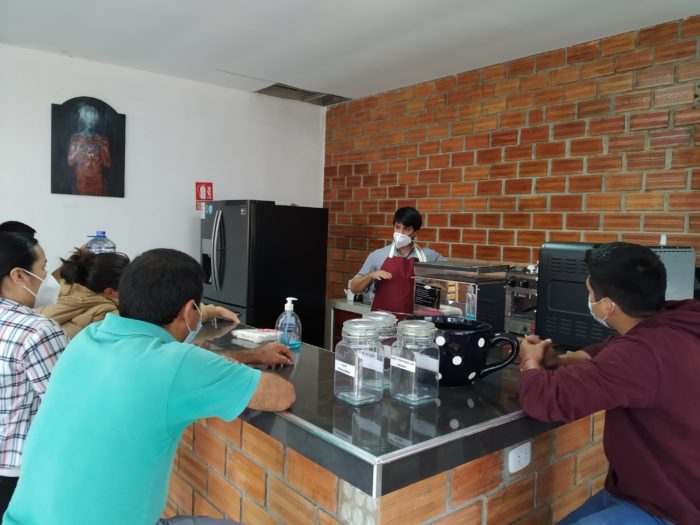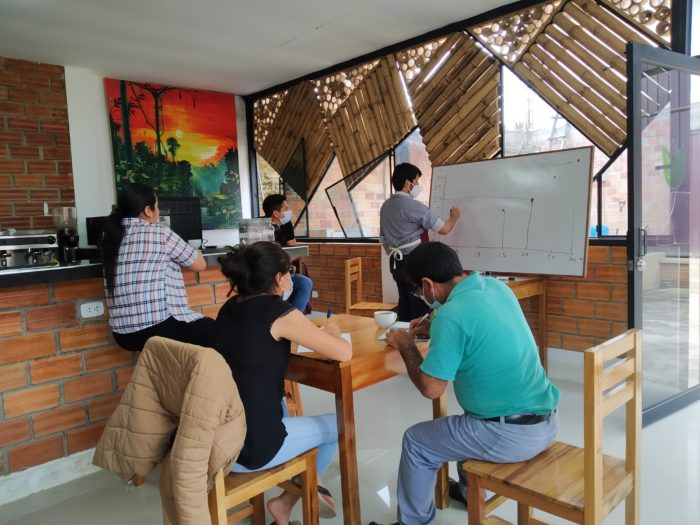
The APROECO (Asociacion de Productores Ecologicos) cooperative is located in the scenic village of Moyobamba, Peru. APROECO works to provide quality services to support their members’ entrepreneurial capacity and commercialize their products with high quality standards, in harmony with the environment. APROECO commercializes green coffee to local and international buyers and most of the cooperative’s members own about 2.5 ha of coffee, the main source of income for their farmer-members.
APROECO sought support from NCBA CLUSA’s USAID-funded Farmer-to-Farmer program to assess the status of its coffee shop and ecolodge, seeking suggestions for improvements. Farmer-to-Farmer volunteer Felipe Aliaga and John Gurley worked with APROECO to develop an agritourism plan aligned with the business goals of cooperative.
Due to COVID-19 related travel restrictions, the Farmer-to-Farmer program implemented a new hybrid volunteer plan. With this plan, one in-country volunteer and one U.S.-based volunteer collaborate together on an assignment. Felipe was the in-country volunteer and previously worked with farmers, co-ops, and coffee shops in different regions of Peru to maximize their competitive edge and the quality of their final product. John, the U.S.-based volunteer, has extensive outdoor experience, among some of his many accolades, has served on several not-for-profit Boards, is an alum of the Land Ethic Leaders Program from the Aldo Leopold Foundation and is a Leave No Trace practitioner. John also worked for an outbound tour operator for 4.5 years where he led excursions in South America and South East Asia. Felipe and John worked in tandem to provide technical support to APROECO members.
APROECO decided to participate in the Farmer-to-Farmer program to strengthen their co-op´s agricultural technical skills and diversification of income sources. In this agritourism assignment, they wanted to learn more about the tourism sector and their potential to thrive in this industry. The main challenge was understanding how this sector works and learning how to connect APROECO’s coffee route with the current tourism offer in the region. The cooperative also sought support from the Farmer-to-Farmer volunteers to improve their coffee shop as it’s considered an important component of their coffee route.

Felipe conducted practical sessions with APROECO members and taught them different extraction methods for coffee preparation. APROECO’s team then gave feedback to its members to support improvement and continuous training. APROECO members have been using these new coffee roasting methods and applying Felipe’s advice to strengthen their skills.
Luz Nangely Guevara Huaman, an APROECO certification supervisor said, “Felipe taught me a lot about how to manage a coffee shop, good practices of coffee preparation by using different extraction methods and the importance of the roasting process to deliver a good cup of coffee. All this knowledge was new for me and will help me enormously to run the coffee shop soon. John, the international volunteer, has helped me understand the tourism sector and showed us what the potential tourist sources are for APROECO so we can start molding the idea of this possible new adventure and starting step by step on the tourism business sector.”
Like many businesses around the world, APROECO had to adjust to the negative impacts of the COVID-19 pandemic. The 300-member cooperative saw a decrease in new members during 2020. The business operations, especially the transport of coffee from the farm to the co-op’s facilities changed as well. APROECO had to establish more collection points to facilitate the transport of their coffee due to road closures and restrictions from the government to contain the spread of COVID-19. APROECO also implemented a biosecurity system at its facility and provided members with a biosecurity kit, which contained hand sanitizers, face masks, and cleaning alcohol.


